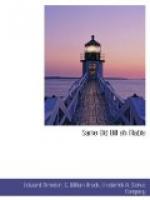I here give a tentative list of some Celtic words found in dialects. Their etymologies are discussed in my Etymological Dictionary (1910), as they are also found in literary use; and the words are fully explained in the English Dialect Dictionary, which gives all their senses, and enumerates the counties in which they are found. It is doubtless imperfect, as I give only words that are mostly well known, and can be found, indeed, in the New English Dictionary. I give only one sense of each, and mark it as N., M., or S. (Northern, Midland, or Southern), as the case may be. The symbol “gen.” means “in general use”; and “Sc.” means Lowland Scotch.
Art, or airt, Sc., a direction of the wind; banshee, Irish, a female spirit who warns families of a death; beltane, N., the first of May; bin, M., a receptacle; boggart, bogle, N., M., a hobgoblin; bragget, N., M., a drink made of honey and ale; brat, N., M., a cloth, clout; brock, gen., a badger; bug, N., a bogy; bugaboo, N., M., a hobgoblin; capercailyie, Sc., a bird; cateran, Sc., a Highland robber; char, N., a fish; clachan, Sc., a hamlet; clan, N., M., a class, set of people; claymore, Sc., a two-handed sword; colleen, Irish, a young girl; combe, gen., the head of a valley; coracle, M., a wicker boat; coronach, Sc., a dirge; corrie, Sc., a circular hollow in a hill-side; cosher, Irish, a feast; crag, craig, N., a rock; crowd, N., S., a fiddle; dulse, N., an edible sea-weed; dun, gen., brown, greyish; duniwassal, Sc., a gentleman of secondary rank; fillibeg, Sc., a short kilt; flummery, Sc., M., oatmeal boiled in water; gallowglass, Sc., Irish, an armed foot-soldier; galore, gen., in abundance; gillie, Sc., a man-servant; gull, a name of various birds; hubbub, hubbaboo, Irish, a confused clamour; inch, Sc., Irish, a small island; ingle, N., M., fire, fire-place;




